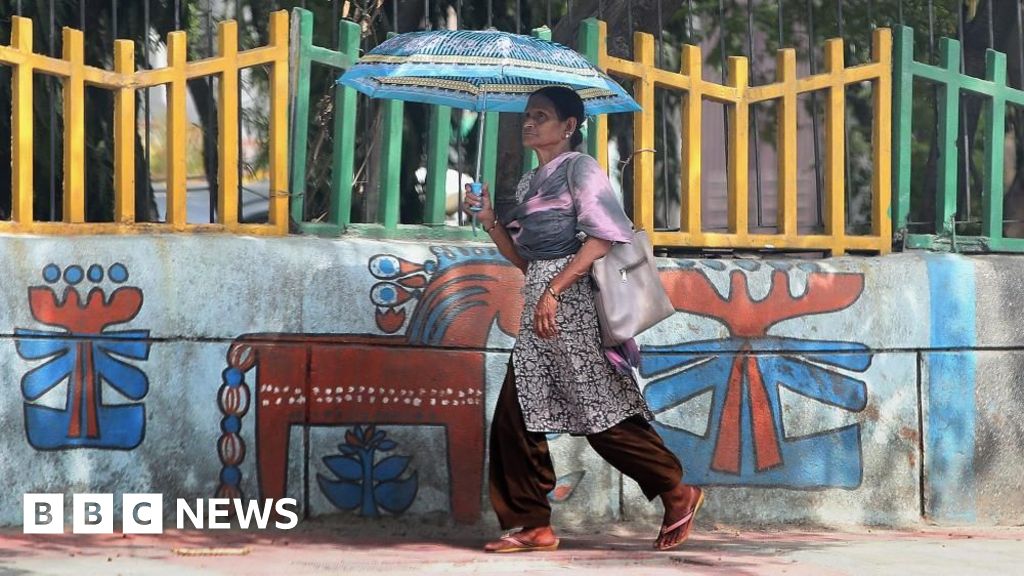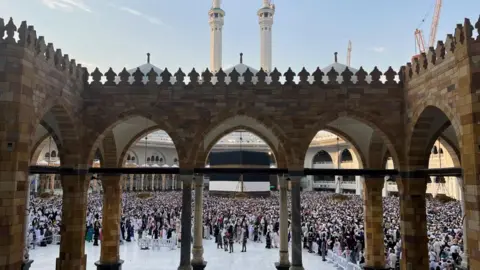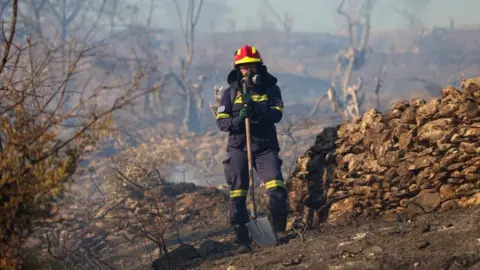Extreme heat hits countries around the world

Many parts of the world are currently experiencing above-average temperatures, with meteorologists saying this is largely a result of global warming.
While some areas are seeing colder conditions, far more regions are enduring temperatures described as being quite a lot warmer than average. According to BBC Weather’s Chris Fawkes, these heatwaves are “the fingerprint of climate change”.
Extreme heat can be deadly – 30,000 people died in the 2003 European heatwave – but such high temperatures over a prolonged period can also increase the risk of wildfires which have already broken out in parts of California in the US.
Swathes of the globe including North America, southern and eastern Asia and south-eastern Europe are currently experiencing extreme temperatures.
North America
 EPA
EPAAbout one in five Americans – more than 70 million people – are currently subject to warnings about excessive temperatures as high pressure has formed a “heat dome” which traps warm air underneath.
There are also warnings in force across four Canadian provinces – New Brunswick, Nova Scotia, Ontario and Quebec.
US weather officials say temperatures could exceed 38C (100F) in the second half of the week.
While much of the continent struggles with the heat, Mexico and southern Texas have been hit by the first named storm of the North Atlantic hurricane season.
Three people died on the Mexican coast while the US National Hurricane Centre has warned of “life-threatening” flooding and mudslides in north-eastern Mexico and southern Texas.
India
 EPA
EPANorthern India is experiencing a weeks-long heatwave, with temperatures of 44-45C (113F) recorded.
The prolonged heat has led to power consumption records being broken as Indians turn up fans and air conditioning, leading to power cuts in Delhi on Monday. Water supplies have also been affected in the city.
Dozens of people have died from the heat since India’s summer began in March, with 50 dying across a three-day period earlier this month in the states of Uttar Pradesh and Odisha.
Summers in India are usually hot and humid, but this year the heat has been exceptionally harsh with longer, more intense and frequent heatwaves.
Saudi Arabia
 Reuters
ReutersExtreme heat in Saudi Arabia is being blamed for the deaths a number of Muslim pilgrims in Mecca.
According to reports by the AFP news agency, which the BBC has not confirmed, more than 1,000 people have died while undertaking the annual Hajj pilgrimage.
While there have been deaths at Hajj before due to crushes and fires, the Saudi national meteorological centre reported a high of 52C (125F) earlier this week at the Grand Mosque in Mecca, according to AFP.
Saudi officials have been distributing water to pilgrims and advising people to avoid being outdoors during the hottest hours of the day between 10:00 and 16:00.
Greece
 EPA
EPAGreece has reported a number of deaths during the earliest heatwave recorded in the country.
Several tourists have died since the extreme heat began – including the British TV and radio presenter Michael Mosley.
Greek authorities have moved to close the Acropolis in Athens in recent days while schools have shut. Firefighters have also been tackling a wildfire on the island of Lesvos.
Although Greece is no stranger to excessive heat during the summer, meteorologists say winds from North Africa are pushing up the temperature.
Related
A New Book Argues That What Happens in Europe Doesn’t…
Remaking the World: European Distinctiveness and the Transformation of Politics, Culture, and the Economy by Jerrold Seigel “No issue in world
Poland plans military training for every adult male amid growing…
Poland’s prime minister, Donald Tusk, has said his government is working on a plan to prepare large-scale military training for every adult male in response t
2025 European Athletics Indoor Championships: Ditaji Kambundji secures women’s 60m…
Switzerland’s Ditaji Kambundji walked away from the 2025 European Athletics Indoor Championships in Apeldoorn on 7 March with much more than her first Europea
Takeaways from the EU’s landmark security summit after Trump said…
BRUSSELS (AP) — European Union leaders are trumpeting their endorsement of a plan to free up hundreds of billions of









